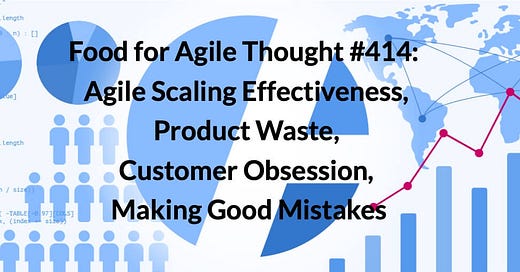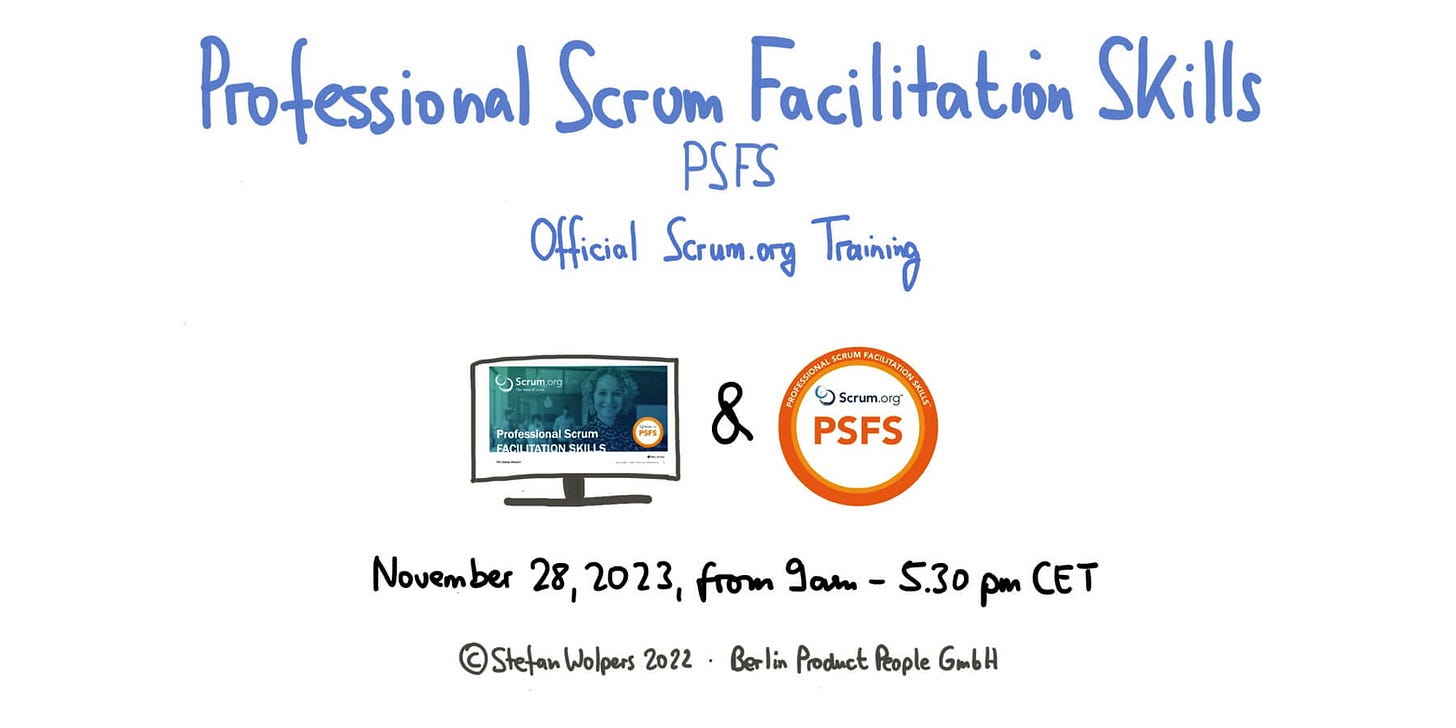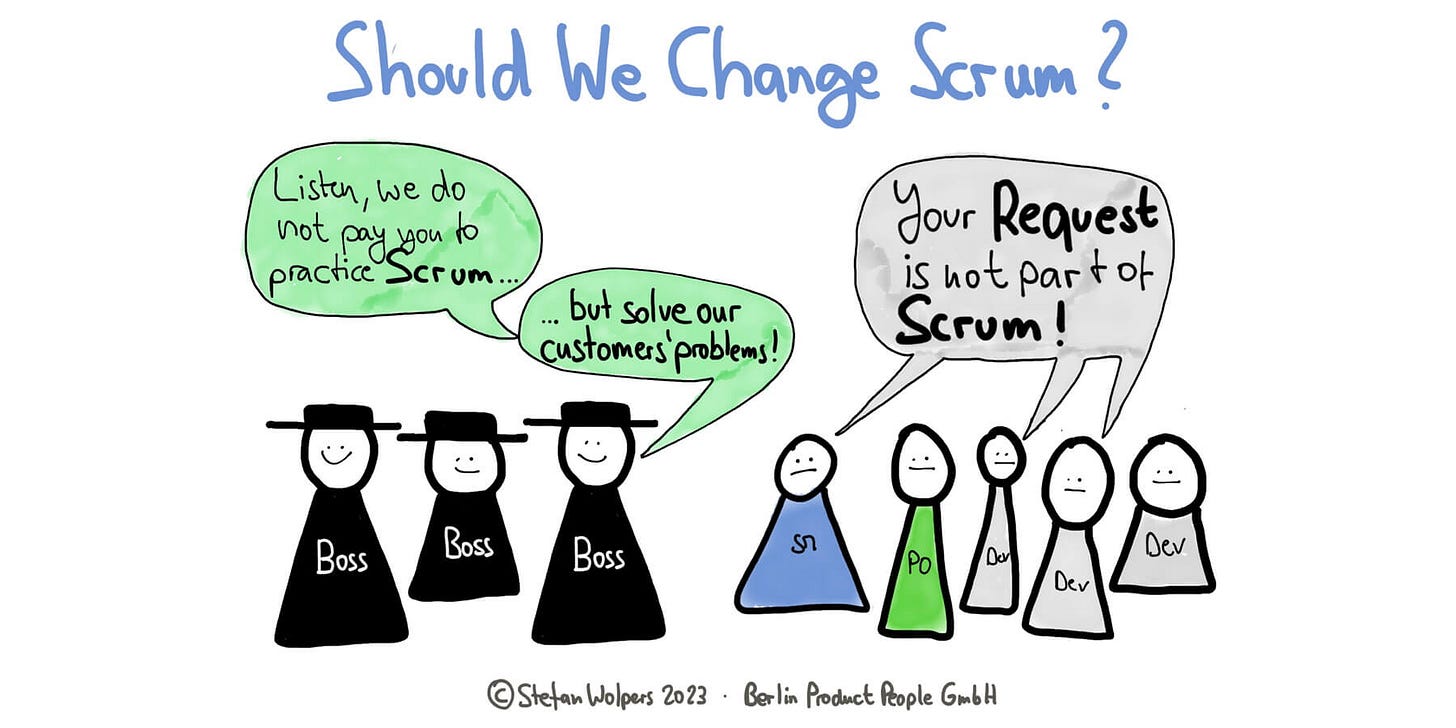Food for Agile Thought #414: Agile Scaling Effectiveness, Product Waste, Customer Obsession, Good Mistakes
Also: Ignore Customers, MVP Canvas, AI Adoption Guide, Learning & Forgetting
TL; DR: Agile Scaling Effectiveness — Food for Agile Thought #414
Welcome to the 414th edition of the Food for Agile Thought newsletter, shared with 49,319 peers.
This week, Christiaan Verwijs and Daniel Russo analyze Agile scaling effectiveness, highlighting minor differences and suggesting alignment with organizational culture, while Thorsten Ball discusses modern software bloat due to user expectations. Adam Mastroianni and Russ Roberts contrast factual and emotional retention when learning, and Tim Harford emphasizes the importance of a safe environment for acknowledging errors for continuous learning and improvement. Also, we ask: ‘Should we change Scrum?’
Then, Maret Kruve suggests segmenting customer feedback for a better understanding of product needs, and John Cutler discusses the invisible yet significant impact of waste in product development through 15 metaphors. Moreover, Jeff Gothelf provides tips for building a customer-centric organization, plus Rob Zuber encourages businesses to experiment with AI, sharing CircleCI’s journey from brainstorming to AI integration.
Lastly, Paulo Caroli discusses the ‘Build the MVP Canvas’ activity for structured product idea validation. Roman Pichler introduces the downloadable checklist for the GO Product Roadmap, and Egor Savochkin talks about the pace of software development, linking it to technical debt. Finally, Stephen Dubner emphasizes viewing tragedies as cumulative missteps to shift the perspective for mitigation.
📖 Get notified when the Scrum Anti-Patterns Guide book is available!
Did you miss the previous Food for Agile Thought’s issue 413?
👉 Join 500-plus peers and help create the next edition of the Scrum Master Salary Report!
🏆 The Tip of the Week: Agile Scaling Effectiveness
Christiaan Verwijs, Daniel Russo: Do Agile Scaling Approaches Make A Difference? An Empirical Comparison of Team Effectiveness Across Popular Scaling Approaches
Christiaan Verwijs and Daniel Russo explore various Agile scaling strategies like SAFe and LeSS, revealing through a broad survey that scaling strategy shows minor differences in team effectiveness. The study suggests selections should align with organizational culture and management style instead.
Author: Christiaan Verwijs
🍋 Lemon of the Week
Tim Denning (via Medium): Agile Software Development Needs to Die (And Everyone Knows It)
This week’s Lemon critiques Agile development as a stifler of innovation, likening it to a restrictive cult that fosters laziness and tribalism in tech sectors.
Source: Medium: Agile Software Development Needs to Die (And Everyone Knows It)
Author: Tim Denning
➿ Agile & Scrum
Thorsten Ball (via Every): Why We Don’t Ship Software as Fast as We Used To
Thorsten Ball reflects on the perceived bloat in modern software compared to earlier, leaner versions, attributing the change to increased user expectations and complex functionalities, mirroring evolved standards in other industries.
Source: Every: Why We Don’t Ship Software as Fast as We Used To
Author: Thorsten Ball
🎙 Russ Roberts and Adam Mastroianni (via Econlib): Learning and Mostly Forgetting
Psychologist Adam Mastroianni and EconTalk’s Russ Roberts delve into the fleeting nature of factual retention versus the lasting impact of emotional and value-driven “vibes” on our learning and interactions.
Source: Econlib: 🎙 Learning and Mostly Forgetting
Authors: Russ Roberts and Adam Mastroianni
Tim Harford: The Art of Making Good Misstakes
Tim Harford discusses a study showing good teams admit more mistakes, highlighting the importance of a safe environment for acknowledging errors, which fosters learning and improvement, contrasted by a fear-driven culture where denial prevails, hindering progress.
Source: The Art of Making Good Misstakes
Author: Tim Harford
🎓 🖥 💯 🇬🇧 Professional Scrum Facilitation Skills Class w/ PSFS Certificate — November 28, 2023
The Professional Scrum Facilitation Skills (PSFS) training by Berlin Product People is a guaranteed one-day official Scrum.org class for advanced Scrum practitioners and agile coaches, including the industry-acknowledged PSFS certification. This PSFS training class is in English.
Enjoy the benefits of a compact immersive class with like-minded agile peers from 09:00–17:30 o’clock CEST.
Learn more: 🖥 💯 🇬🇧 Professional Scrum Facilitation Skills Class w/ PSFS Certificate — November 28, 2023.
👉 From time to time, we can offer last-minute seats for training classes at cost to individuals who do not have access to a corporate training budget. If you like to be notified about these opportunities, please register here.
🎯 Product
Maret Kruve (via Medium): When You Should Not Listen to Your Customers
Maret Kruve explores the nuanced task of deciphering customer feedback in product management, suggesting a segmentation approach to understand expressed, unexpressed, and unrecognized user needs.
Source: Medium: When You Should Not Listen to Your Customers
Author: Maret Kruve
John Cutler: 15 Metaphors for Waste In Product Development
John Cutler explores 15 metaphorical scenarios illustrating various forms of waste in product development, emphasizing these issues’ invisibility yet significant impact. The post highlights common challenges and the importance of recognizing and addressing waste.
Source: 15 Metaphors for Waste In Product Development
Author: John Cutler
Jeff Gothelf: 10 Tips for Building a Customer Obsessed Organization
Jeff Gothelf follows up on a post about building a customer-obsessed organization by offering practical tips to overcome each challenge. While not silver bullets, these tips aim to guide readers in initiating the right changes towards customer-centricity.
Source: 10 Tips for Building a Customer Obsessed Organization
Author: Jeff Gothelf
(via CircleCI): AI adoption for software: a guide to learning, tool selection, and delivery
Rob Zuber likens the current AI wave to the initial phases of the internet and mobile tech, urging businesses to experiment with AI to stay competitive. Sharing CircleCI’s phased journey from brainstorming to production, this piece is a conceptual guide for integrating AI into applications.
Source: CircleCI: AI adoption for software: a guide to learning, tool selection, and delivery
📯 Should We Change Scrum?
Can we or should we change Scrum, or is it a sacrilege to tweak the ‘immutable’ framework to accommodate our teams’ and organizations’ needs?
Not so fast; don’t just dismiss augmenting Scrum as leaving the path, contributing to the numerous Scrumbut mutations, giving Scrum a bad name. However, in our rapidly evolving business landscape, sticking rigidly to traditional Scrum by the book could be a straightjacket stifling innovation, user focus, and adaptability.
From ensuring cultural compatibility to facing technical debt challenges and emerging technologies, discover ten compelling reasons why augmenting Scrum isn’t just okay — it’s necessary for modern teams.
Read on to discover when and how to adapt Scrum responsibly without diluting its essence.
Learn more: Should We Change Scrum?
🛠 Concepts, Tools & Measuring
Paulo Caroli: Build the MVP Canvas
Paulo Caroli delves into the ‘Build the MVP Canvas’ activity, exploring the Minimum Viable Product Canvas as a potent tool rooted in lean startup philosophy. This canvas facilitates a structured approach to validating and refining product ideas.
Source: Build the MVP Canvas
Author: Paulo Caroli
Roman Pichler: GO Product Roadmap Checklist
Roman Pichler introduces the GO Product Roadmap as a tool for goal-oriented road-mapping, addressing common application challenges with a downloadable checklist shared in the article.
Source: GO Product Roadmap Checklist
Author: Roman Pichler
(via booking.com): Measuring Technical Debt to Avoid the Boiling Frog Syndrome
Egor Savochkin explains that software development is about making changes quickly. However, rushing in too early can lead to problems later, making future changes harder and slower, likely resulting in technical debt that demands extra effort over time.
Source: booking.com: Measuring Technical Debt to Avoid the Boiling Frog Syndrome
🎶 Encore
🎙 Stephen J. Dubner (via Freakonomics): How to Succeed at Failing, Part 1: The Chain of Events
Stephen Dubner underscores tragedies as cumulative outcomes of multiple missteps rather than isolated incidents, illustrated through harrowing tales of wildfires and calamities, urging a shift in perspective for potential mitigation.
Source: Freakonomics: 🎙 How to Succeed at Failing, Part 1: The Chain of Events
Author: Stephen J. Dubner
📅 Training Classes, Meetups & Events 2023
Upcoming classes and events:
🖥 💯 🇩🇪 November 1–2 — Live Virtual Class: Professional Scrum Master Training (PSM I; German)
🖥 💯 🇬🇧 November 8 — Live Virtual Meetup: Hands-on Agile #55: Designing Agile Ecosystems with Org Topologies™ w/ Alexey Krivitsky and Roland Flemm (English)
🖥 🇩🇪 November 21–24 — Live Virtual Class: Professional Scrum Product Owner Training (PSPO I; German)
🖥 💯 🇬🇧 November 21 — Live Virtual Meetup: Hands-on Agile #56: The Big Product Picture — Creating Value though Alignment w/ Stefan Wolpers (English)
🖥 💯 🇬🇧 November 28 — Live Virtual Class: Professional Scrum Facilitation Skills Training (PSFS; English)
🖥 🇩🇪 December 11–12 — Live Virtual Class: Professional Scrum Master Training (PSM I; German)
🖥 🇩🇪 December 13–14 — Live Virtual Class: Professional Scrum Product Owner Training (PSPO I; German)
🖥 🇬🇧 December 18–19 — Live Virtual Class: Advanced Professional Scrum Master Training (PSM II; English)
👉 See all upcoming classes here
🗞️ Last Week’s Food for Agile Thought Edition
📺 Join 5,000-plus Agile Peers on Youtube
Now available on the Age-of-Product Youtube channel:
Hands-on Agile 53: An Agile Coaches Guide to Storytelling w/ Bob Galen
Hands-on Agile 52: From Wild West to the Agile Manifesto with Jim Highsmith
Hands-on Agile Extra: How Elon Musk Would Run YOUR Business mit Joe Justice
Hands-on Agile 43: Outcome-Based Product Planning with Jeff Gothelf
Hands-on Agile 42: Lean Roadmapping and OKRs with Janna Bastow
Hands-on Agile 38: The Product Owner with Roman Pichler
✋ Do Not Miss Out: Join the 19,000-plus Strong ‘Hands-on Agile’ Slack Community
I invite you to join the “Hands-on Agile” Slack Community and enjoy the benefits of a fast-growing, vibrant community of agile practitioners from around the world.
If you like to join all you have to do now is provide your credentials via this Google form, and I will sign you up. By the way, it’s free.
🎓 Do You Want to Read more like this?
Well, then:
📰 Join 49,000 peers and sign-up for my weekly newsletter
📅 Join 5,000-plus peers of the Hands-on Agile Meetup group
🐦 Follow me on Twitter and subscribe to my blog Age of Product
💬 Alternatively, join 18,000-plus peers of the Slack team “Hands-on Agile” for free.









